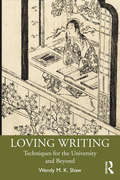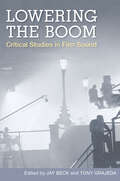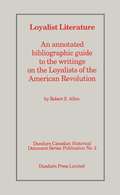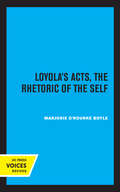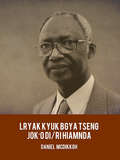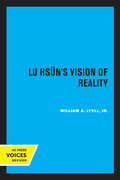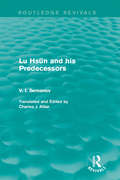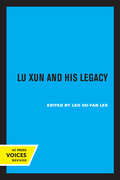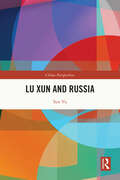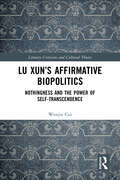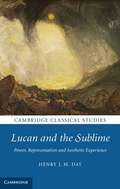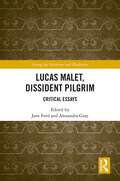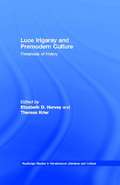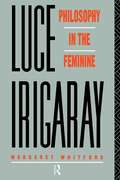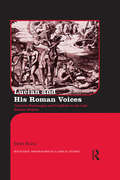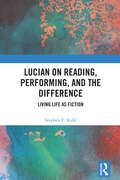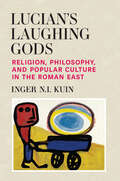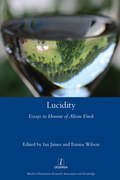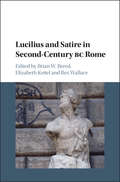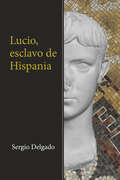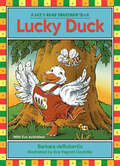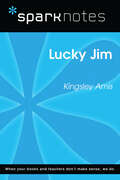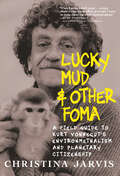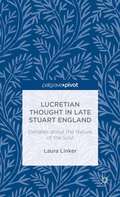- Table View
- List View
Loving Writing: Techniques for the University and Beyond
by Wendy M.K. ShawThis writing textbook bridges factual, critical, and expressive modes of writing to help students develop a reflective sense of why and how to write for university, professional, and public audiences. Exploring the ways in which writing builds tools for argument both in and beyond the university, it enables students to break out of the dusty and formulaic patterns of writing that too often threaten to render academic studies irrelevant. In a playful, personal, essayistic style, it examines existing academic writing methods and develops new modes of narrative-based expression rooted in the humanities. Reflective analysis invites emerging writers to self-consciously craft convincing and impassioned writing practices using an expanded methodological toolbox. It aims to imbue academic writing with the expressive potential of artistic research by transforming existing methods of articulating analysis within a broader expressive system, developing skills more typical of creative writing, such as providing a setting, considering frame, engaging emotions, expansion, and concision. If we believe in the value of our thoughts, discoveries, and arguments, we must enable them to sing. Loving Writing can be used as a textbook for advanced or introductory college writing courses and provides innovative guidance to liberal arts students seeking to develop their writing abilities.
Lowering the Boom: Critical Studies in Film Sound
by Jay BeckAs the first collection of new work on sound and cinema in over a decade, Lowering the Boom addresses the expanding field of film sound theory and its significance in rethinking historical models of film analysis. The contributors consider the ways in which musical expression, scoring, voice-over narration, and ambient noise affect identity formation and subjectivity. Lowering the Boom also analyzes how shifting modulation of the spoken word in cinema results in variations in audience interpretation. Introducing new methods of thinking about the interaction of sound and music in films, this volume also details avant-garde film sound, which is characterized by a distinct break from the narratively based sound practices of mainstream cinema. This interdisciplinary, global approach to the theory and history of film sound opens the eyes and ears of film scholars, practitioners, and students to film's true audio-visual nature. Contributors are Jay Beck, John Belton, Clark Farmer, Paul Grainge, Tony Grajeda, David T. Johnson, Anahid Kassabian, David Laderman, James Lastra, Arnt Maasø, Matthew Malsky, Barry Mauer, Robert Miklitsch, Nancy Newman, Melissa Ragona, Petr Szczepanik, Paul Théberge, and Debra White-Stanley.
Loyalist Literature
by Robert S. AllenThis highly readable guide is more than a bibliography. Written in a narrative style, it is as well a short history of the Loyalists: who they were, why they left, where they settled, and what their legacy is.
Loyola's Acts: The Rhetoric of the Self (The New Historicism: Studies in Cultural Poetics #36)
by Marjorie O'Rourke BoyleThis title is part of UC Press's Voices Revived program, which commemorates University of California Press’s mission to seek out and cultivate the brightest minds and give them voice, reach, and impact. Drawing on a backlist dating to 1893, Voices Revived makes high-quality, peer-reviewed scholarship accessible once again using print-on-demand technology. This title was originally published in 1997.
Lryak Kyuk Bgya Tseng Jok’o Di / Ri Hiamnda
by Daniel McdikkohHiamnda, the language of the Jaba people located in the central part of the Middle Belt area of Nigeria. It is spoken by a myriad of Jaba people groups who, by and large, may speak the main hiam Ham language, but may have vernacular variations of the language. Less than a decade ago, Hiamnda was on the verge of total obliteration, even though there are approximately a million of Hamnda in existence; this downturn of lingual fortunes for this language is not too far removed from the social, but vicious malady that has afflicted most, if not all, languages in the technological age, namely cultural warfare. This cultural warfare continues to leave in its wake "corpses" of dead languages; one that cease to exist either to none use or that they have been so adulterated to the point that such languages or that they have such adulteration that of necessity leads to total absorption into some of their surrounding major language or its demise. Lryak Kyuk Bgya Tseng Jok'o Di Hiamnda is a third edition of word lists that have been published in Hiamnda by me. Through the grace of God, Almighty these efforts have been paid off and been able to wrest the falling fortune of our language and to put back it back on the track of living human languages currently extant.
Lu Hsun's Vision of Reality
by William A LyellThis title is part of UC Press's Voices Revived program, which commemorates University of California Press’s mission to seek out and cultivate the brightest minds and give them voice, reach, and impact. Drawing on a backlist dating to 1893, Voices Revived makes high-quality, peer-reviewed scholarship accessible once again using print-on-demand technology. This title was originally published in 1976.
Lu Hsün and his Predecessors (Routledge Revivals)
by V. I. SemanovOriginally published in 1980, Alber’s translation of Semanov’s study aimed to contribute to the studies of Chinese literature and the knowledge of Lu Hsün’s work to an English-speaking reader. Lu Hsün was an influential democrat and humanist in early twentieth Century China and his work had a great influence on literature in China. Semanov therefore attempted to place his life and work in the context of his literary predecessors as well as commenting on his world view, his teaching and place in history. This title will be of interest to students of Asian studies and Literature.
Lu Xun and His Legacy
by Leo Ou-fan LeeThis title is part of UC Press's Voices Revived program, which commemorates University of California Press’s mission to seek out and cultivate the brightest minds and give them voice, reach, and impact. Drawing on a backlist dating to 1893, Voices Revived makes high-quality, peer-reviewed scholarship accessible once again using print-on-demand technology. This title was originally published in 1985.
Lu Xun and Russia (ISSN)
by Sun YuBased on Lu Xun's works and book collections, this book explores the significant influence of Russian literature, art, and thinking on Lu Xun's thoughts and works.Through the analysis of rich historical materials and literary texts, this book shows the profound influence of Russian literary and artistic resources on Chinese writers, especially on Lu Xun. It delves into Lu Xun's literary and translation concepts, as well as his intellectual and aesthetic views, all of which bear the imprint of Russian culture. The author closely examines notable themes in his works, including nationality, class, the avant-garde, and cosmopolitanism, which offer insight into his overarching historical vision and provide a glimpse into the era. Unlike previous studies of the influence of Russian literature, this book delves deeper into literary history by examining intellectual history without adhering to a pan-ideological point of view. Through the lens of cultural history, it also illuminates the cultural landscape of modern China, unraveling the intellectual ideas and debates of the twentieth century and the emergence of Chinese left-wing literature.The title will appeal to scholars, students, and general readers interested in Lu Xun studies, modern Chinese literature, and Chinese culture.
Lu Xun’s Affirmative Biopolitics: Nothingness and the Power of Self-Transcendence (Literary Criticism and Cultural Theory)
by Wenjin CuiThis book explores an extraordinary case of affirmative biopolitics through the study of Lu Xun (1881–1936), the most prominent cultural figure of modern China. Diverging from the Enlightenment-humanist framework in reference to which Lu Xun is commonly understood, it demonstrates how his thinking is defined by a naturalistic conception of culture that is best understood in the global context of what Foucault defines as the biological turn of modernity. In comparison to ontologically-grounded modern Western theories of life, it brings to light the deep connection between Lu Xun’s affirmative biopolitics and the epistemic ground of Chinese tradition―what is known as correlative thinking. Combining close readings of literary texts with a theoretical consideration of broader issues of culture, this book is an essential read for scholars and students who are interested in Lu Xun, modern Chinese intellectual history, comparative studies of Chinese and Western thought, and the question of affirmative biopolitics.
Lucan and the Sublime
by Henry J. M. DayThis is the first comprehensive study of the sublime in Lucan. Drawing upon renewed literary-critical interest in the tradition of philosophical aesthetics, Henry Day argues that the category of the sublime offers a means of moving beyond readings of Lucan's Bellum Civile in terms of the poem's political commitment or, alternatively, nihilism. Demonstrating in dialogue with theorists from Burke and Kant to Freud, Lyotard and Ankersmit the continuing vitality of Longinus' foundational treatise On the Sublime, Day charts Lucan's complex and instructive exploration of the relationship between sublimity and ethical discourses of freedom and oppression. Through the Bellum Civile's cataclysmic vision of civil war and metapoetic accounts of its own genesis, through its heated linguistic texture and proclaimed effects upon future readers and, most powerfully of all, through its representation of its twin protagonists Caesar and Pompey, Lucan's great epic emerges as a central text in the history of the sublime.
Lucan's Egyptian Civil War
by Jonathan TracyThis book explores Lucan's highly original deployment of contradictory Greco-Roman stereotypes about Egypt (utopian vs. xenophobic) as a means of reflecting on the violent tensions within his own society (conservatism vs. Caesarism). Lucan shows the two distinct facets of first-century BC Egypt, namely its ancient Pharaonic heritage and its latter-day Hellenistic culture under the Ptolemies, not only in spiritual conflict with one another (via the opposed characters of Acoreus, priest of old Memphis, and the Alexandrian courtier Pothinus) but also inextricably entangled with the corresponding factions of the Roman civil war and of Nero's Rome. Dr Tracy also connects Lucan's portrayal of Egypt and the Nile to his critical engagement with Greco-Roman discourse on natural science, particularly the Naturales Quaestiones of his uncle Seneca the Younger. Lastly, he examines Lucan's attitude toward the value of cultural diversity within the increasingly monocultural environment of the Roman Mediterranean.
Lucas Malet, Dissident Pilgrim: Critical Essays (Among the Victorians and Modernists)
by Alexandra Gray Jane FordPopular novelist, female aesthete, Victorian radical and proto-modernist, Lucas Malet (Mary St. Leger Harrison, 1852-1931) was one of the most successful writers of her day, yet few of her remarkable novels remain in print. Malet was a daughter of the ‘broad church’ priest and well-known Victorian author Charles Kingsley; her sister Rose, uncle, Henry Kingsley and her cousin Mary Henrietta Kingsley were also published authors. Malet was part of a creative dynasty from which she drew inspiration but against which she rebelled both in her personal life and her published work. This collection brings together for the first time a selection of scholarly essays on Malet’s life and writing, foregrounding her contributions to nineteenth- and twentieth-century discourses surrounding disability, psychology, religion, sexuality, the New Woman, and decadent, aesthetic and modernist cultural movements. The essays contained in this volume explore Malet’s authorial experience—from both within the mainstream of the British literary tradition and, curiously, from outside it—supplementing and nuancing current debates about fin-de-siècle women’s writing. The collection asks the question ‘who was Lucas Malet?’ and ‘how—despite its popularity—did her courageous, unique and fascinating writing disappear from view for so long?’
Luce Irigaray and Premodern Culture: Thresholds of History (Routledge Studies in Renaissance Literature and Culture)
by Elizabeth D. Harvey Theresa KrierThe essays in this groundbreaking collection stage conversations between the thought of the controversial feminist philosopher, linguist and psychoanalyst Luce Irigaray and premodern writers, ranging from Empedocles and Homer, to Shakespeare, Spenser and Donne. They explore both the pre-Enlightenment roots of Luce Irigaray's thought, and the impact that her writings have had on our understanding of ancient, medieval and Renaissance culture. Luce Irigaray has been a major figure in Anglo-American literary theory, philosophy and gender studies ever since her germinal works, Speculum of the Other Woman and This Sex Which Is Not One, were published in English translation in 1985. This collection is the first sustained examination of Irigaray's crucial relationship to premodern discourses underpinning Western culture, and of the transformative effect she has had on scholars working in pre-Enlightenment periods. Like Irigaray herself, the essays work at the intersections of gender, theory, historicism and language. This collection offers powerful ways of understanding premodern texts through Irigaray's theories that allow us to imagine our past and present relationship to economics, science, psychoanalysis, gender, ethics and social communities in new ways.
Luce Irigaray: Philosophy in the Feminine (Wiley Blackwell Readers Ser.)
by Margaret WhitfordFirst published in 1991. Routledge is an imprint of Taylor & Francis, an informa company.
Lucian and His Roman Voices: Cultural Exchanges and Conflicts in the Late Roman Empire (Routledge Monographs in Classical Studies #19)
by Eleni BoziaLucian and His Roman Voices examines cultural exchanges, political propaganda, and religious conflicts in the Early Roman Empire through the eyes of Lucian, his contemporary Roman authors, and Christian Apologists. Offering a multi-faceted analysis of the Lucianic corpus, this book explores how Lucian, a Syrian who wrote in Greek and who became a Roman citizen, was affected by the socio-political climate of his time, reacted to it, and how he ‘corresponded’ with the Roman intelligentsia. In the process, this unique volume raises questions such as: What did the title ‘Roman citizen’ mean to native Romans and to others? How were language and literature politicized, and how did they become a means of social propaganda? This study reveals Lucian’s recondite historical and authorial personas and the ways in which his literary activity portrayed second-century reality from the perspectives of the Romans, Greeks, pagans, Christians, and citizens of the Roman Empire
Lucian on Reading, Performing, and the Difference: Living Life as Fiction
by Stephen E. KiddLucian’s writings raise questions about the nature of reading and viewing the lives of others; this book explores these questions through close readings of Lucian’s dialogues and stories.Lucian scholarship over the past decades has been dominated by terms like performance and personas, so this book asks simply: what happens when we are not performing? When we read or sit in the audience, we cannot perform for the world we are viewing. Nor can we act on our desires and beliefs, since we have no self in that viewed world to move around like an avatar. Is there anything left of us at such moments? As a satirist, Lucian explored these questions not through philosophical arguments but stories – a traveler who looks down on earth from the moon, a philosopher who retires to a contemplative life “as if high up in a theater”, a narrator who demands that a reader not believe anything he writes, and many more. Over the course of seven chapters, this book explores these questions of reading, performing, and the difference via detailed analyses of some of Lucian’s best-known works: Hermotimus, Charon, Icaromenippus, Nigrinus, Rooster, True Stories, and others.Lucian on Reading, Performing, and the Difference is suitable for students and scholars of ancient Greek literature, Classics and the Humanities, particularly those interested in questions about Lucian and literary interpretation.
Lucian’s Laughing Gods: Religion, Philosophy, and Popular Culture in the Roman East
by Inger NI KuinNo comic author from the ancient world features the gods as often as Lucian of Samosata, yet the meaning of his works remain contested. He is either seen as undermining the gods and criticizing religion through his humor, or as not engaging with religion at all, featuring the gods as literary characters. His humor was traditionally viewed as a symptom of decreased religiosity, but that model of religious decline in the second century CE has been invalidated by ancient historians. Understanding these works now requires understanding what it means to imagine as laughing and laughable gods who are worshipped in everyday cult. In Lucian's Laughing Gods, author Inger N. I. Kuin argues that in ancient Greek thought, comedic depictions of divinities were not necessarily desacralizing. In religion, laughter was accommodated to such an extent as to actually be constituent of some ritual practices, and the gods were imagined either to reciprocate or push back against human laughter—they were never deflated by it. Lucian uses the gods as comic characters, but in doing so, he does not automatically negate their power. Instead, with his depiction of the gods and of how they relate to humans—frivolous, insecure, callous—Lucian challenges the dominant theologies of his day as he refuses to interpret the gods as ethical models. This book contextualizes Lucian’s comedic performances in the intellectual life of the second century CE Roman East broadly, including philosophy, early Christian thought, and popular culture (dance, fables, standard jokes, etc.). His texts are analyzed as providing a window onto non-elite attitudes and experiences, and methodologies from religious studies and the sociology of religion are used to conceptualize Lucian’s engagement with the religiosity of his contemporaries.
Lucidity: Essays in Honour of Alison Finch (Legenda)
by Ian James and Emma WilsonThis collection of essays addresses the question of lucidity as a thematic in literature and film but also as a quality of both expression and insight in literary criticism and critical thought more generally. The essays offer treatments of lucidity in itself and in relation to its opposites, forms of obscurity and darkness. They offer attention to problems of philosophical thought and reason, to questions of literary and poetic form, and of photographic and filmic contemplation. Ranging from engagements with early modern writing through to more recent material the contributions focus in particular on nineteenth- and twentieth-century French prose and poetry, the field which has been the predominant focus of Alison Finch’s critical writing. They are written as tributes to the distinctively lucid insights of her work and to the breadth and clarity of its intellectual engagement.
Lucilius and Satire in Second-Century bc Rome
by Brian W. Breed Elizabeth Keitel Rex WallaceThis volume considers linguistic, cultural, and literary trends that fed into the creation of Roman satire in second-century BC Rome. Combining approaches drawn from linguistics, Roman history, and Latin literature, the chapters share a common purpose of attempting to assess how Lucilius' satires functioned in the social environment in which they were created and originally read. Particular areas of focus include audiences for satire, the mixing of varieties of Latin in the satires, and relationships with other second-century genres, including comedy, epic, and oratory. Lucilius' satires emerged at a time when Rome's new status as an imperial power and its absorption of influences from the Greek world were shaping Roman identity. With this in mind the book provides new perspectives on the foundational identification of satire with what it means to be Roman and satire's unique status as 'wholly ours' tota nostra among Latin literary genres.
Lucio, esclavo de Hispania
by Sergio DelgadoLa historia de un gran Imperio contada por los protagonistas que la forjaron. <P><P>Cansado de magos de gafas redondas, brujas, demonios y demás figuras fantásticas que inundan la literatura juvenil, el autor se ha propuesto escribir una novela histórica dedicada al público adolescente, entretenida y al mismo tiempo veraz; una oportunidad única de aprender de forma divertida sobre nuestro pasado más remoto.
Lucky Duck: Short Vowel U (Let's Read Together ®)
by Barbara deRubertisLet&’s Read Together books merge rhyme and vowel sounds in delightfully zany stories kids will want to read again and again. Each of the 15 books in this classic series by award-winning author/educator Barbara deRubertis will give your child a jumpstart on reading success."Story lines are silly and inventive, and recall Dr. Seuss&’s Cat in the Hat for the building of rhythm and rhyming words." —School Library JournalLucky Duck gets stuck in a muddy puddle. Has this duck ran out of luck? (This easy-to-read story features the short &“u&” vowel sound.)
Lucky Jim (SparkNotes Literature Guide Series)
by SparkNotesLucky Jim (SparkNotes Literature Guide) by Kingsley Amis Making the reading experience fun! Created by Harvard students for students everywhere, SparkNotes is a new breed of study guide: smarter, better, faster. Geared to what today's students need to know, SparkNotes provides: *Chapter-by-chapter analysis *Explanations of key themes, motifs, and symbols *A review quiz and essay topicsLively and accessible, these guides are perfect for late-night studying and writing papers
Lucky Mud & Other Foma: A Field Guide to Kurt Vonnegut's Environmentalism and Planetary Citizenship
by Christina JarvisA fascinating deep dive into Kurt Vonnegut&’s oeuvre and legacy, illuminating his unique perspective on environmental stewardship and our shared connections as humans, Earthlings, and stardust.Vonnegut&’s major apocalyptic trio—Cat&’s Cradle, Slapstick, and Galápagos—prompt broad global, national, and species-level thinking about environmental issues through dramatic and fantastic scenarios. This book, Lucky Mud and Other Foma, tells the story of the origins and legacy of what Kurt Vonnegut understood as &“planetary citizenship&” and explores key roots, influences, literary techniques, and artistic expressions of his interest in environmental activism through his writing. Vonnegut saw writing itself as an act of good citizenship, as a way of &“poisoning&” the minds of young people &“with humanity . . . to encourage them to make a better world.&” Often that literary activism meant addressing real social and environmental problems—polluted water, soil, and air; racial and economic injustice; isolating and dehumanizing technologies; and lives and landscapes desolated by war. Vonnegut&’s remedies took many forms, from the redemptive power of the arts to artificial extended families to vital communities and engaged democracies. Reminding us of our shared connections as humans, as Earthlings, as stardust, Lucky Mud helps fans, scholars, and book lovers of all kinds experience how Vonnegut&’s writings purposely challenge readers to think, create, and love.
Lucretian Thought in Late Stuart England: Debates about the Nature of the Soul
by Laura LinkerHow did writers understand the soul in late seventeenth-century England? This book considers depictions of the soul in literary texts that engage with Lucretius's Epicurean philosophy in De rerum natura or through the writings of the most important natural philosopher to disseminate Epicurean atomism in England, Walter Charleton (1619-1707).
